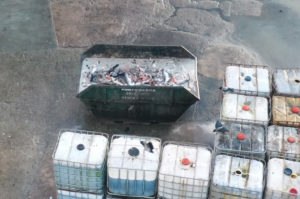Animal rights group calls for ‘moratorium’ on Scottish salmon industry

Animal welfare campaign group Compassion in World Farming has called for a halt on any expansion for the salmon farming industry in Scotland, with a damning report that alleges widespread instances of poor fish welfare. Salmon farmers, however, have described CIWF’s report as “wrong, inaccurate and misleading.”
The report, Underwater Cages, Parasites & Dead Fish: Why a Moratorium on Scottish Salmon Farming Expansion is Imperative, has been published by a global network of NGOs in 30 countries, led by CIWF. It combines a range of allegations regarding the salmon industry’s welfare record and environmental impact with findings and images from an undercover investigation carried out over the winter of 2020. CIWF said its team went to 22 sites on the west coast of Scotland, Skye and Shetland, operated by five of the largest six salmon farmers.
Photography and video footage shows individual fish in a poor state, with wounds, missing eyes and numbers of sea lice. CIWF said it also recorded an instance of dead fish being disposed of in a landfill site, contrary to regulations.
CIWF said that conditions it found at one particular site were so bad that it has reported its findings to the Animal and Plant Health Agency, under the terms of the Animal Health and Welfare (Scotland) Act 2006.
CIWF campaigns against all forms of factory farming. Dr Krzysztof Wojtas, Head of Fish Policy at the organisation, said: “Given the numerous welfare and environmental issues within the Scottish salmon industry, plans to expand are completely irresponsible.
“We are calling on the Scottish Government for a moratorium on the expansion of the Scottish Salmon industry. Confining carnivorous species in underwater cages and depleting our oceans of wild fish in order to feed them, is pure madness. Ultimately, we directly challenge whether farming essentially wild, migratory fish, such as salmon, has any place in a sustainable food system.”
The salmon industry has criticised the report for using selective images that, it argues, do not reflect the typical level of fish welfare. Ronnie Soutar, Head of Veterinary Services at Scottish Sea Farms and a long-standing fish vet, said: “No-one wants to see any fish potentially suffering but thankfully, those occasions are rare. By selectively publicising those very few pictures, CIWF are being hugely misleading. Those pictures do not reflect my experience of the extraordinarily high standards Scotland’s fish farmers are setting.”
The report also includes assertions that have been challenged by the industry, such as the argument that salmon farming is the primary reason for the decline in wild salmon – a phenomenon that has also been observed in regions where no fish farms are sited.
Tavish Scott, CEO of the Scottish Salmon Producers Organisation (SSPO) said: “There are key parts of this report which are wrong, inaccurate and misleading – claims we would have pointed out to CIWF, had they approached anybody in the Scottish salmon farming sector before publishing it.
“Salmon farming is one of the country’s greatest environmental and economic success stories. The Scottish salmon sector has built itself up from a small crofting sideline to the UK’s biggest food export in just 50 years; in doing so, it has created thousands of well-paid jobs in some of Scotland’s most fragile rural areas and is producing a protein with one of the lowest carbon footprints around.”
“We are extremely proud of the support given to us by consumers, global fish-welfare accreditation bodies and governments – all of whom appreciate the healthy, nutritious and sustainable food we produce.”

Photo: Compassion in World Farming

